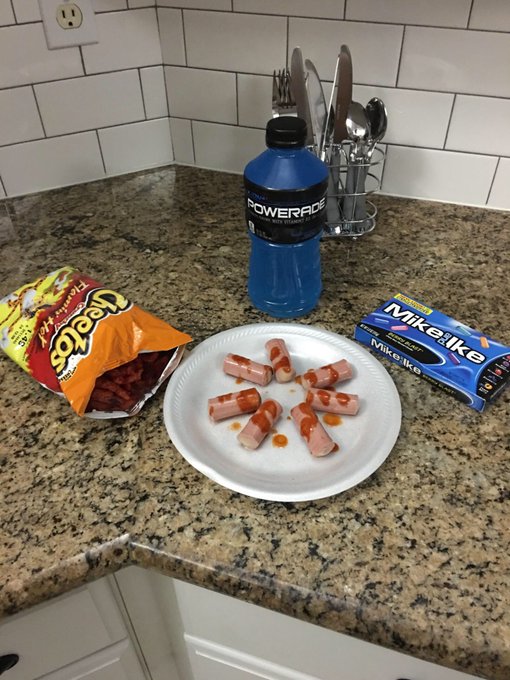
The Washington football team's kitchen is yards ahead of most fine-dining restaurants. (Courtesy of Washington football team)
I don’t understand most things about football, least of all the food.
Why do we eat the greasiest, sauciest, cheesiest foods while watching some of the most physically fit people in the world exhaust themselves on TV? What is it about the sight of immense and muscular humans crashing into each other that makes us crave nachos? Are we subconsciously trying to protect our own organs with seven-layer dip?
No other sport is so embedded in American culture that it has its own cuisine. But what about the players themselves? Are they as into buffalo wings as the millions of Americans watching them?
Like the myth of the bikini body, there’s no such thing as a football body.
You could be 5’9” and 182 pounds like Pittsburgh Steelers wide receiver Demarcus Ayers. You could be 6’4” and 323 pounds like Minnesota Vikings defensive tackle Linval Joseph. Different positions require different levels of speed, strength, size, and agility. Those spandex breeches, on the other hand, seem to be one-size-fits-all.
Likewise, there’s no standard diet that all football players follow. Take Jalen Ramsey, whose photo of his dinner went a little viral this summer.
Commenters were appalled, but Ramsey was unfazed.
Some football players are housing 5,000 calories a day, like Troy Hill, the cornerback for the LA Rams who started the season as one of the smallest guys in the league. He’s trying to get his weight up to the mid 180s so he can tackle taller, heavier wide receivers. Hill described his diet as “Just eat. Just eat eat eat.” He’ll start the day with waffles, bacon or sausage, an omelet, and a protein shake. To be clear that’s one meal, not a Monday through Friday plan.
Then it’s pasta and chicken for lunch, double-portion on the pasta (the nutritionists are always pushing him to eat more food). Then his girlfriend might make him a lasagna with some more chicken for dinner. In between, he’ll put away a peanut butter and jelly sandwich or two. “I get kinda tired of eating,” he said.
Then there’s Cam Thomas, the Rams defensive tackle, who says he’s trying to drop about 15 pounds from his 343 pound frame. Defensive tackles haven’t always prized speed, but in recent years the game has gotten faster and players like Thomas have to stay lighter on their feet. For Thomas, breakfast looks more like a shake, and don’t call it a smoothie when you’re talking to football players. Or maybe a waffle with turkey bacon. Lunch sounds like your aunt Debbie’s standard order at her local salad chain: spinach salad with chicken, hard-boiled egg, light ranch, hold the croutons. Thomas has a major sweet tooth—Reese’s, Skittles, and Sweet Tarts are his downfalls—but now he has candy once a week max.
Instead he snacks on Skinny Pop popcorn, strawberries, and water. We’d almost feel bad for him if he weren’t making millions of dollars a year.
Now consider the case of Lorenzo Alexander, a veteran player currently with the Buffalo Bills, who went from playing defensive tackle to linebacker–a switch that required a total body transformation. Tackles are built for body slamming; linebackers are built to cover ground. Alexander lost nearly 75 pounds in one off-season. “I didn’t have any carbs,” he said. “I was really strict, no treat meals. But as I got smaller, I had to add in carbs so I had the energy to go out and play.” “Smaller,” in Alexander’s case, means 240 pounds.
These days Alexander’s diet looks like a nutritionist’s fantasy: half a cup of oatmeal for breakfast with egg whites and turkey bacon, or maybe a waffle made with buckwheat or cassava flour. A few hours later he’ll have a shake with protein powder, fruit, and some kind of powdered vegetable substance called Wellness Greens. Lunch is brown rice, maybe a nice piece of salmon, and either broccoli or a side salad. Dinner is the same as lunch. If he’s hungry between meals, he’ll snack on almonds or rice cakes with peanut butter. Sounds so… virtuous.
But wait, because Alexander lets his hair down on Game Day. “After the game I’ll have a cheat meal,” he said. “I’m a huge breakfast person, so I’ll go get some pancakes, waffles, french toast. We call it ‘brinner’ at our house.”
It’s generally easier to eat well when you have a chef and team of nutritionists on hand. Especially if that chef is Jon Mathieson, who came on as executive chef for the Washington pro football team after stints at fine-dining establishments including the St Regis Hotel.
Mathieson’s got a kitchen in the training facility that would make any cook drool. It includes sous vide machines, a brick oven, and a smoker. Thanks to his guidance, Washington players are putting kale and avocado in their shakes. “Chocolate and kale work great together,” he said, while “the avocado thickens it up.” Most days, he serves athletes a plated lunch with a choice of beef, chicken, pork, or fish. “I took guys who just ate salmon or catfish, and now they’re eating cobia, mahi mahi, swordfish, bass, branzino,” he said. No comment on whether he’s instituted white table cloths yet.
Mathieson tries to incorporate fun foods, too, like “Fajita Fridays” with house-made salsa, skirt steak, and brown rice.
But what happens after a player plays his last game? Retirement seems like a great time to reacquaint oneself with chili cheese fries. Eddie Jackson, who played for teams including the New England Patriots and the Miami Dolphins before retiring in 2009, had to work to stay at a lean 195 pounds. When he played for Miami, he said, players were weighed every Monday and fined $1,000 for every pound over goal weight they were.
“I grew up in Texas with a dad who was an amazing cook. We loved barbecue, meatloaf, macaroni and cheese. So I had to find different ways to make the foods I loved, like mac and cheese without four types of cheese and meatloaf with turkey instead of beef.”
But since retiring, Jackson has become what he calls a huge foodie. He competed on the Food Network’s “Master Chef,” won “Food Network Star” in 2015, and is now the host of “Kids BBQ Championship.” He runs a food truck specializing in Caribbean-meets-Southern cuisine and, oh, he’s also a personal trainer.
“My thing now is just moderation,” Jackson said. He still treats his diet like a job, sticking to the rules Monday through Friday and giving himself some wiggle room on the weekends.
“It’s like the military. When you’re forced to have your clothes folded a certain way, even when you leave, you still fold your clothes that way. I left the game, but I still find myself being conscious of what I eat,” he said.
If his Instagram is any indication, he’s not suffering much.



No comments:
Post a Comment